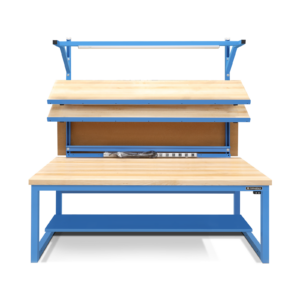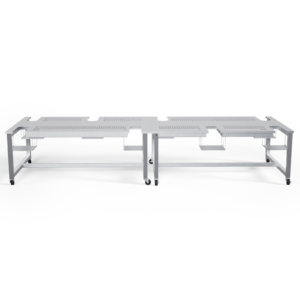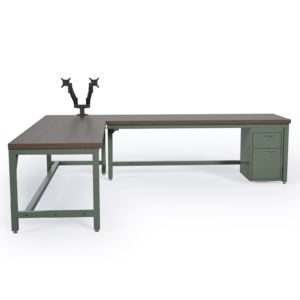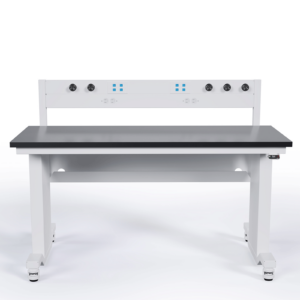Reshoring Manufacturing Back to the U.S.A.
After traveling to the Gulf Coast Conference, Formaspace was on the road again last week to the ‘Chicagoland‘ area, where we exhibited our technical furniture at The Assembly Show, held at the Donald E. Stevens Convention Center in Rosemont, Illinois. This time Chris Andrews, VP of Sales and Marketing was joined at the event by Jeff Turk, CEO and President of Formaspace. The Assembly Show, now in its second year, has grown to over 200 exhibitors. The mood was cautiously upbeat about the economy.

Over the last five years, manufacturing has made a steady recovery in the U.S. And so exhibitors at The Assembly Show were eager to show off their latest manufacturing and automation gear, ranging from automated assembly systems and robots, laser guided and cordless hand tools, new bonding adhesives, the latest computer software planning solutions for manufacturing, to full-blown virtual reality simulations for manufacturing (based on the Oculus Rift platform recently purchased by none other than Facebook).
Keynote Speech: Bringing Jobs Back to the USA, Rebuilding America’s Manufacturing through Reshoring
The opening keynote presentation by Tim Hutzel and David Lippert was just up our alley. These two have long experience in the manufacturing industry. David Lippert is President of the Hamilton Caster & Manufacturing Company, located just north of Cincinnati, Ohio. His longtime manufacturing consultant and friend, Tim Hutzel, is an expert in lean manufacturing operations and business processes. 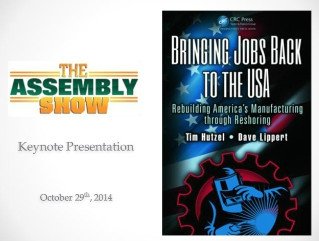
The keynote presentation got a lot of people talking and thinking from the start. The first order of business was a request from the presenters: Stand up and take off one of your shoes! Slowly the audience rose up and each removed a shoe, unclear if the next command was to move into the latest yoga position or attempt a stretchy t’ai chi maneuver. Where is your shoe made? Raise your hand if it’s Made-in-the-USA! Sadly in this crowd there were only a very few shoes which were made in this country. Twenty other countries ranked higher on the shoe manufacture list. Next Hutzel and Lippert went down a list of iconic products, including the little red “Radio Flyer” wagons from your childhood (if you are of a certain age). Once made in Chicago, these little red wagons are now made offshore.
The problem, in their view, has been that many American management teams have been lured into offshore manufacturing deals by focusing on only one aspect of their businesses: the ‘piece part price’. They have overlooked the hidden costs of offshoring, which are harder to quantify in some cases but just as real. Examples include: Missed sales opportunities that occur when parts coming from overseas are lost or delayed in transit, increased handling and stocking costs, design errors and quality problems that inevitably occur when locating manufacturing thousands of miles from design, engineering and marketing teams — and mostly importantly — your end customers.
Reflections on What Has Happened to American Manufacturing
After the keynote, Tim Hutzel and David Lippert reflected on their keynote presentation, their book and where American manufacturing needs to go from here. Tim Hutzel was both philosophical and frustrated. “We have exported our wealth to these other countries,” he said. “We don’t have the role models we used to have in manufacturing. We don’t have the skills we used to have to manufacturing — cause they are gone. … Kids don’t have the desire to work in factories.” David Lippert sees the concept of offshoring as a waste of human potential here at home. He noted that “societally every individual is gifted in a different way.
As we have pushed people away from manufacturing, we have squandered the ‘giftedness’ of people. … We have discouraged the trades that used to be treasured. We think that has hurt the country. … On the micro level — from a company standpoint — having all my operations in one place makes a huge difference in teamwork, in efficiency, in innovation, in QA, in fixing problems, in getting better. All of those things would be much more difficult if we were worlds apart, countries apart, even states apart! But certainly the longer the distance, the bigger the barrier to overcome. We’re a better company because we’re all (located) together.”
The Journey into Lean is Helping American Manufacturers Compete Globally

David Lippert talked about what he calls “the Journey into Lean Manufacturing“. It’s become part of their manufacturing DNA at Hamilton Caster. Lippert describes it this way. “Lean is a lot of things to a lot of people,” he said. “In our world it’s essentially eliminating waste. … One of the biggest struggles in a lean journey is identifying waste. … Tim taught us from the beginning about the evil ‘ings’: things like moving, walking, transporhting, checking. The evil ‘ings’ are things that cost money but are not really necessary — (things) that our customers frankly aren’t really wanting to pay for. … Minimizing the space between operations is an important thing.“
As an aside, if you are looking to eliminate waste and achieve more efficient workflow at your manufacturing facility, you should talk to one of our experienced Formaspace furniture consultants. Give them a call today at 800.251.1505.
How Can Each of Us Promote Reshoring of Manufacturing Jobs to America?
According to David Lippert, it starts with an understanding of where things — like your shoe, or your kid’s little red Radio Flyer wagon — are made.
“As Tim pointed out, at every level and pretty much every function that deals with this issue, from purchasing to the presidents of companies, the financial guys, engineering — an awareness of where stuff is made is a good place to start.” “One of the interesting things we talked about (in the keynote) was the little red Radio Flyer wagons. I suspect although most people might guess where they are made, they started here in Chicago and suddenly shifted (offshore) about 10 years ago. I’m going to guess most consumers probably don’t pay a lot of attention to this. …. Just an awareness of where stuff is made would be a good starting point, rather than ‘I’ll just buy the cheapest’. I need to look at where things are made and make decisions that engage more factors than, (what) I’ll call the landed costs. … It starts with that awareness. Do I really want to buy these things — what does that mean to my company and to my country?”
Tim Hutzel Suggests Consumers Need to Demand American-made Products When They Shop
“I think it’s also we as consumers… when we go to a store and we can’t find the product that we want that’s Made-in-the-USA, demand to go to the general manager — whoever is running that store — and to say ‘I’m sorry but I’m leaving because I can’t find the product that I’m looking for (that’s Made-in-the-USA).’ Now you may go to another store and still not be able to find that, but all the more reason to continue with that mantra. I think until people who run businesses understand what the demand is, they are not going to change. If they can understand there is value-added by us wanting to buy products Made-in-the-USA, they are going to start changing their habits. But this is going to be a slow process. It was a slow process for offshoring. It took decades for us to get to our realization ‘holy smokes! What have we done??’ It’s going to take quite a while to reverse the cycle.”
We encourage you to learn more by reading Hutzel and Lippert’s book, Bringing Jobs Back to the USA, Rebuilding America’s Manufacturing through Reshoring.
Formaspace Supports the Renaissance in American Manufacturing

Here at Formaspace we’re proud to support the renaissance in American manufacturing. Why not give us a call today at 800.251.1505 to learn more about our full line furniture as well as our furniture consulting and space planning services. We offer a complete line of stock, semi-custom and custom-made furniture, including electronic assembly workbenches, drafting tables, computer workstations, industrial workbenches, lab benches, packing tables and more.
All our furniture is Made-in-America right here at our factory headquarters in Austin, Texas. We stand behind our products with the industry’s best guarantee: a full 12 years. Join our roster of well-known clients — including Apple, Boeing, Dell, Eli Lilly, Exxon Mobile, General Electric, Intel, Lockheed Martin, Medtronic, NASA, Novartis, Stanford University and Toyota.





